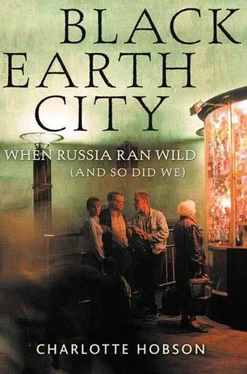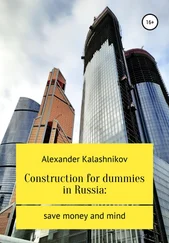“It’s a two-year course,” said Yuri, who was going to England, “and then maybe I’ll stay there, who knows. If I can get a good job.”
“Don’t you think you’d miss Russia?”
“Well, yes, but if I have the choice between sitting in Voronezh with no money and dreaming about going abroad, or sitting in England with five hundred dollars in my pocket and dreaming about Voronezh, I know which I’ll take.”
“I can see exactly what you’re going to become,” said Tanya. “You’ll come back to visit us and you’ll be complaining, ‘Oh, this country is so filthy!’ ‘Oh, why do they have this ridiculous system of waiting in line!’”
Yuri laughed. “I’ll come back and we’ll have a huge party with as much of everything as we like.”
This was the first wave of purely economic emigration that Russia had seen; previously, exiles had left with a certain glow of heroism, whether they were fleeing tsarist censorship in the nineteenth century or persecution by the KGB in the twentieth. In Paris or New York they had dreamed and plotted revolution, so that they would be able to go home. On the face of it, however, nothing would stop these young emigrés from visiting Russia whenever they wanted. But in practice Tanya was right: the invisible frontier that separates the West from the rest of the world would keep them apart. The ones who left would find it almost impossible to return, just as it was impossible for me to stay, for me to be any more Russian than I was.
When we reached the station, Mitya and I rode on ahead with most of the provisions. The path seemed perfectly clear: down to the river and straight until we came to the tents that Viktor had been setting up since morning. But somehow we found ourselves pushing our bicycles through a patch of thorny hillocks, lost. After a while the strap on my sandal snapped and I had to go barefoot; then Mitya got a puncture. When we finally found the others, their mood was frosty. They’d been waiting for the food and drink for more than an hour.
“It’s just typical of you two,” we were told. “So selfish.”
As the sun set over the river, the mosquitoes formed great dusty clouds above our camp. We lit a fire and tried to raise our spirits with alcohol. It was a perfect summer evening; golden light lay on the water until almost ten o’clock, and the clouds glowed pink above us. But the atmosphere did not improve. We sat huddled in the smoke, irritably slapping the insects away and failing to get the fire hot enough to cook the meat. By the time the food was ready, the smell of roasting fat was enough to turn my stomach. I crawled into a tent and lay there, shivering.
The next day, having wheeled our bicycles back to the station, Mitya and I sat on the grass and smoked. It was our last day. I could barely open my eyes against the flat, midday light. Mitya was also looking down, his face set in an expression that I recognized: very still, eyes narrowed. When he spoke, it was distantly, as though I had already left.
“What will you do when you get back to England?”
“I don’t know, see my family, get ready to go back to university. Miss you.” There was a pause. “What will you do?”
“Oh, I’ll… the same as ever. Work nights in the shop, go out to the woods, go to the cinema. Get drunk.”
“Who will you go to the cinema with?”
“I don’t know.”
“I’m going to see how much a ticket will cost for you to come over in August.”
Mitya sighed. “Oh Charlotte, it’s really not possible. I can’t earn enough money before then, and I don’t want to be paid for.”
“Don’t be like that. You can pay me back later, whenever.”
“And how am I going to do that, I wonder? Shall I put it on my credit card, or shall I just rob a bank?”
There was a silence.
“It doesn’t have to be the end,” I said. We had been saying this to each other for weeks, trying to sound convincing.
“No, it doesn’t,” muttered Mitya. “I’m sorry.”
When the elektrichka finally arrived most of the windowpanes in the carriage were missing, as usual, and the wind and engine noise made it impossible to talk. I watched Mitya as he lit another cigarette and smoked it out the window. He was very pale and the scar I had noticed the first time I met him stood out darkly on his cheek. We rattled across the iron bridge over the Voronezh river. For the last time I saw the whole city beneath me: the factory chimneys white against the sky, the fishermen in boats on the reservoir, the dome of the cathedral among the dilapidated wooden houses, and the mustard-colored Stalinist buildings in the center. It looked half-abandoned. Even the railway station was quiet.
That evening Emily and I stuffed the last few things into our suitcases and piled them onto the porters’ cart in the yard. In the fading light the hostel, framed by shivering poplars, was almost attractive. We trailed past the rubbish dump, down Peace Prospect and through the line of babushkas still waiting by their buckets of boiled potatoes. Everyone was laughing and joking, as though this was just another train journey.
“When you come back, let’s all go down to the Black Sea together,” Viktor suggested. “Autumn’s the time to go, September or October. It’s beautiful—”
“Definitely,” we agreed. “Otdykh!”
“We’ll meet you here on the platform and go straight to the sea.”
“Yes! We’ll celebrate right here—”
“Let’s drink to that.”
We’d given away most of our belongings—the saucepans, the sandwich toaster and The Seven Pillars of Wisdom (invaluable for wedging the refrigerator door shut) are still, perhaps, doing service somewhere in Voronezh—but all the same we struggled to cram our bags into the luggage compartment. Then, as is the Russian custom, we sat for a minute in silence and invoked the gods of the road. I stared at the floor and concentrated on holding the tears where they were, just behind my eyes.
“People, hurry up!” the conductor yelled. “We’re leaving.”
There was a scramble to get off the train. Mitya grabbed me and kissed me, hard, somewhere near my ear. Then the conductor pushed him onto the platform.
The shouts of Viktor and the girls were silenced as the train pulled away. We watched their mouths moving as they ran alongside us, waving and grinning. Only Mitya stood still, hands thrust deep into his pockets. Then he turned and walked away, hunching his shoulders.
anglichanka (pl. anglichanki )—English girl
apparatchik —Soviet bureaucrat
babushka, babulya —grandmother, old woman
banya —steam bath
bomzh —acronym meaning homeless person
Bozhe moi! —My God!
budka —shed
dachnik (pl. dachniki )—owner of a dacha, a country house
dalshe —further
demi-sek —demi-sec, medium dry
dochka —daughter
dyevushka —girl
dyevka —girl (slightly derogatory)
dvushka —two-kopeck piece
elektrichka (pl. elektrichki )—small electric train for short journeys
entrakt —interval, from the French entracte
fortochka —the small casement that can be opened when the rest of the window is sealed up for winter
garderob —cloakroom, from the French garderobe
Gastronom —food store
golubka (pl. golubki )—female dove; a term of endearment
gorko! —bitter! A word shouted at weddings to make the bride and groom kiss, on the assumption that they should exorcise anything that is bitter or difficult on the first day of their marriage, and then everything will be sweet thereafter.
Читать дальше












